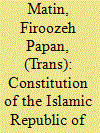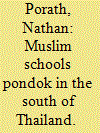| Srl | Item |
| 1 |
ID:
127786


|
|
|
|
|
| Publication |
2014.
|
| Summary/Abstract |
On 3 December 1979, almost one year after Mohammad Reza Shah Pahlavi left Iran, the Constitution of the Islamic Republic of Iran replaced the monarchical constitution of 1906. The new constitution was to guarantee that the monarchy was abolished and the Islamic Republic system of government was enforced in its place. The constitution was to observe the Islamic and the nationalistic aims of the revolution with regard to the demands of a public that came from various social, religious, ethnic, and political backgrounds. Thus the 1979 constitution included differing components, which necessitated the amendments and the modifications that were added to the constitution in 1989. The constitution and its development are subjects that have been discussed in detail by scholars of modern Iran, among whom Asghar Schirazi stands out for his comprehensive study of the constitution. The following translation of the Constitution of the Islamic Republic of Iran highlights the relationship between the 1979 text of the constitution and the 1989 amendments in an attempt to contribute to the ongoing discussions on this subject.
|
|
|
|
|
|
|
|
|
|
|
|
|
|
|
|
| 2 |
ID:
130722


|
|
|
|
|
| Publication |
2014.
|
| Summary/Abstract |
A discordant political relationship, three and a half wars and Pakistan's material support for secessionist militants in the border states of Punjab and Jammu and Kashmir compelled India to harden its international border with Pakistan. An inward-looking economy and the absence of an imperative for regional economic integration also resulted in restricted movement of people and goods across the border. However, in the past decade or so, an emergent Indian economy coupled with both countries' desire to engage themselves constructively have paved the way for softening the border. As the India-Pakistan border gradually opens up for increased trade and travel, a number of issues such as infiltration by terrorists and militants, cross-border shelling and sniping, trafficking of drugs and arms and so on pose a challenge to the effective management of the border. Moreover, inadequate manpower, lack of resources and inadequate cooperation from Pakistan make management of the border difficult. As a result, India has to continuously balance the imperatives of maintaining the border as a barrier against cross-border terrorism with softening it to enable the regulated flow of trade and travel.
|
|
|
|
|
|
|
|
|
|
|
|
|
|
|
|
| 3 |
ID:
135002


|
|
|
|
|
| Summary/Abstract |
This paper focuses on the ponoh/pondok Muslim schools of the south of Thailand. These schools, which are traditional institutions of religious learning and places of religious piety, have experienced conflict and contestations throughout the twentieth century. Pondok have been pulled by different modernizing forces including separatist violence. The paper concludes that the contestations and negotiations with the Thai government are about the development of the local Malay people's modern civic identity within Thailand. It suggests that the introduction of a secular curriculum has had (and still has) its benefits for empowering the Malay-speaking population by supplying them with the cultural tools to contest and civically negotiate their position, culture and heritage within the Kingdom. The paper also provides a history of these schools and their political relationship to the Thai government's policies and to separatist organizations, as well as an update of events relating to the schools during the recent period of separatist and counter-separatist activities.
|
|
|
|
|
|
|
|
|
|
|
|
|
|
|
|